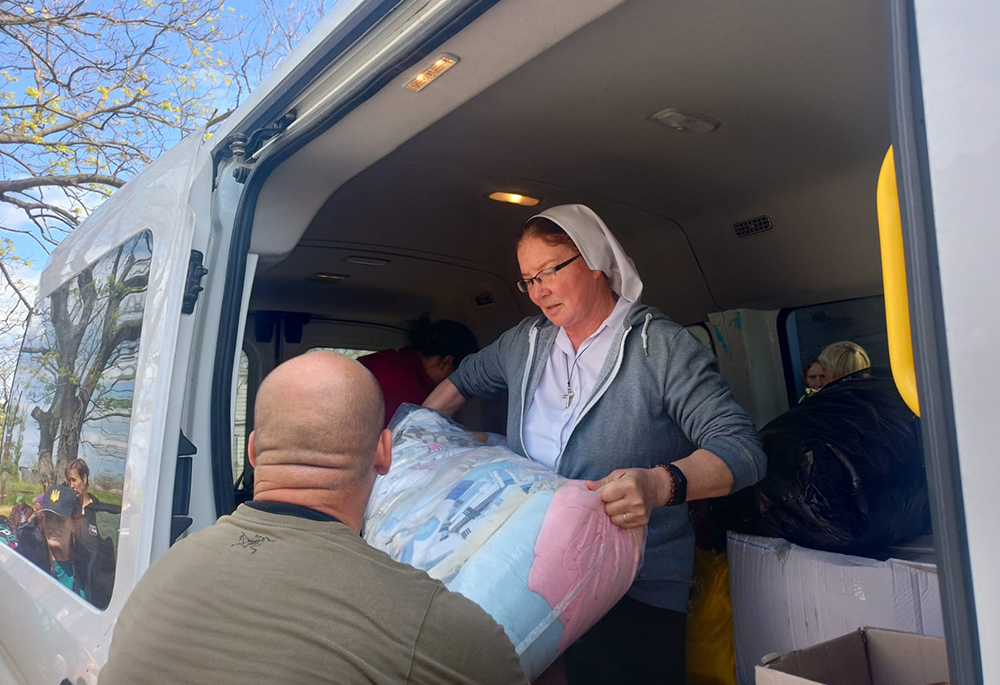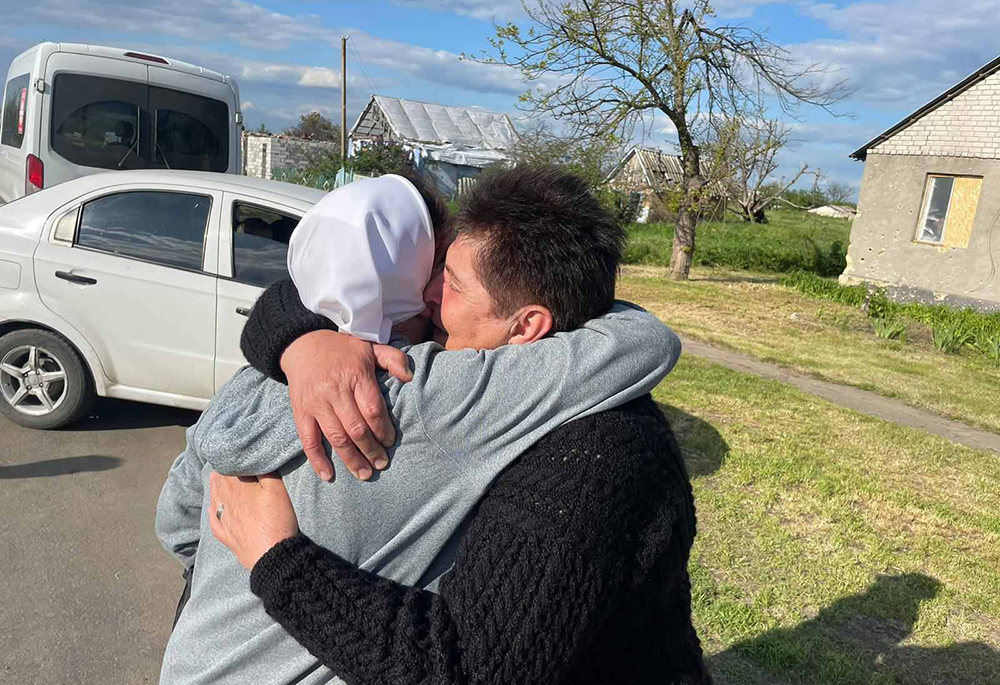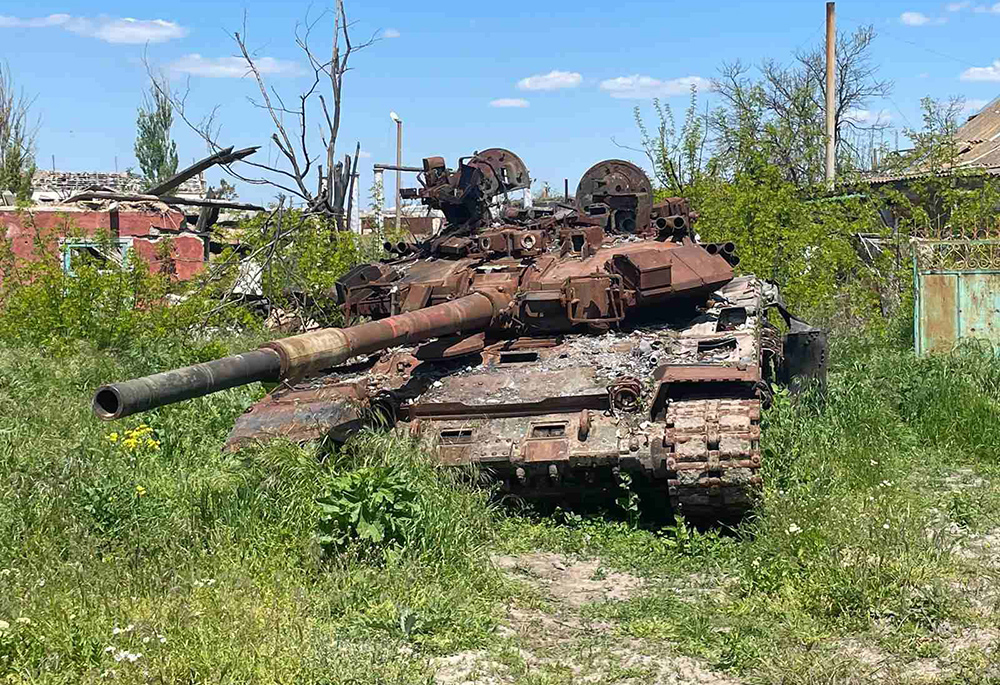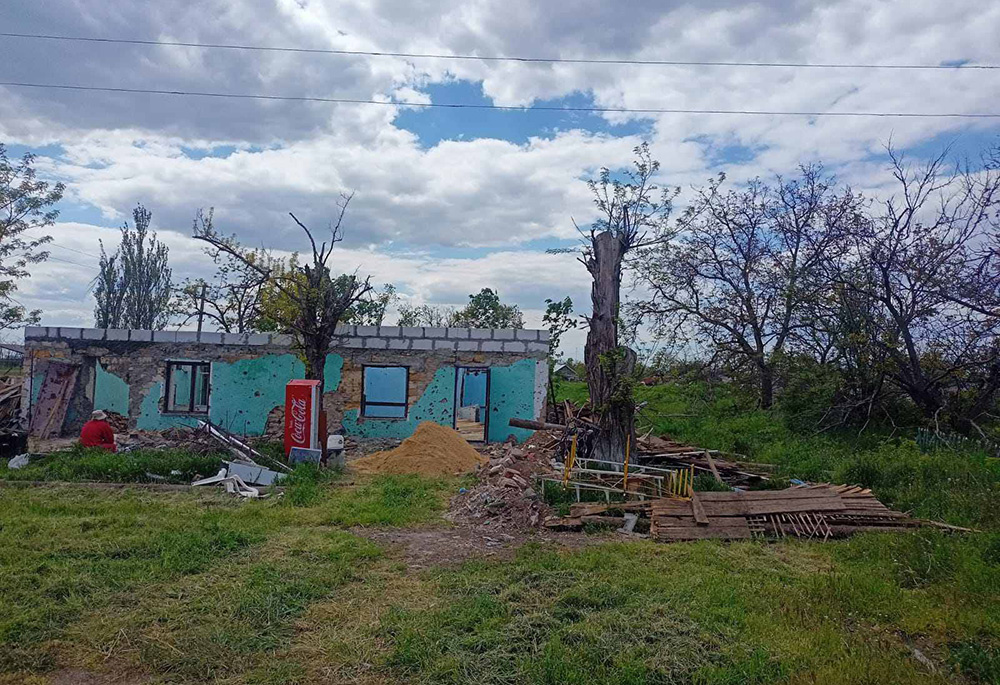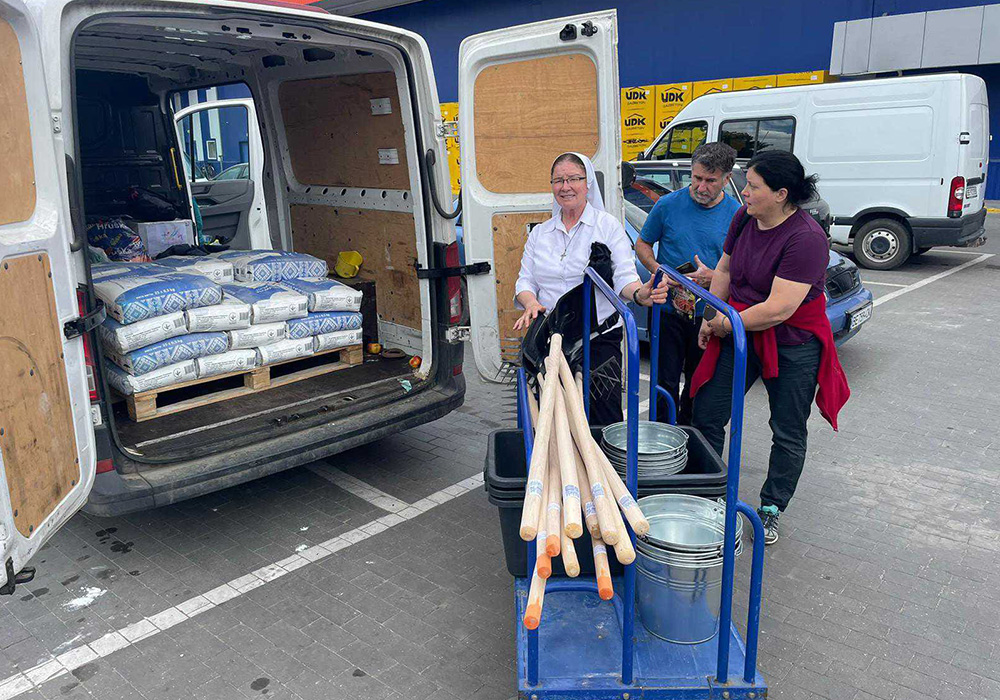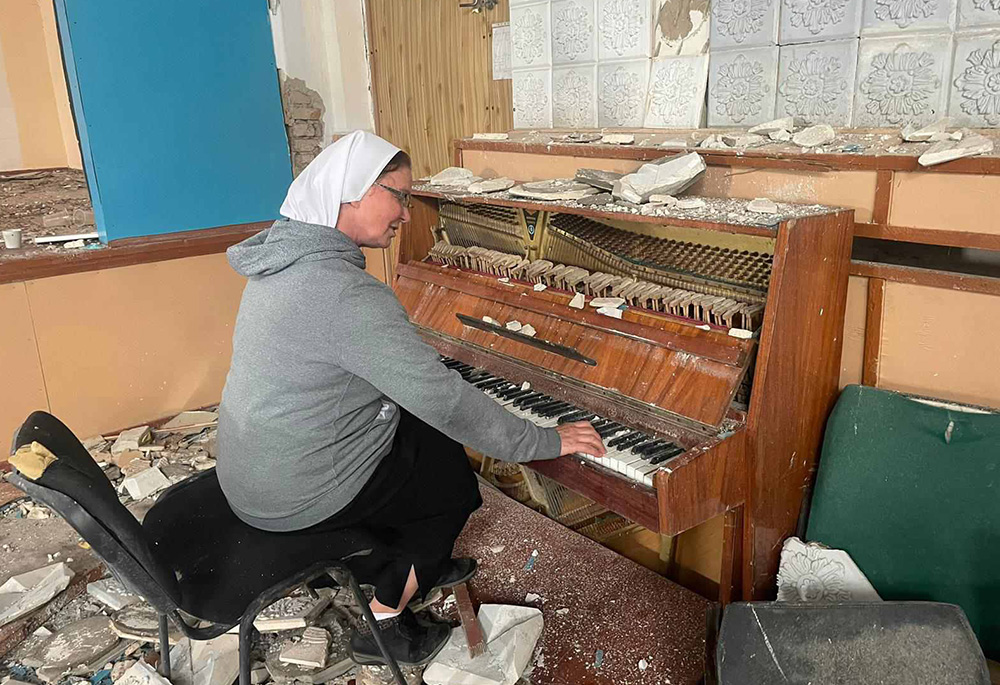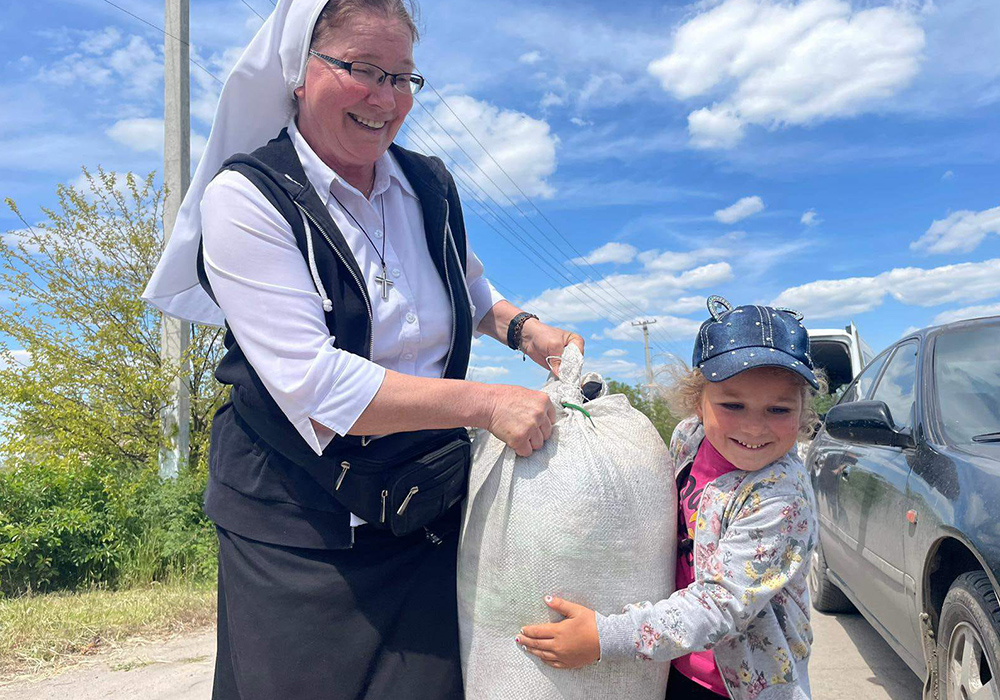
During a recent humanitarian mission to war-torn eastern Ukraine, a child assists Sr. Lydia Timkova carry a bag of supplies, in a village near Mykolaiv. Timkova has traveled across Ukraine to shepherd food and medical supplies to civilians living near the Russian front. (Courtesy of Lydia Timkova)
Editor's note: Today, Global Sisters Report continues our series, Hope Amid Turmoil: Sisters in Conflict Areas, which offers a look at the lives and ministries of women religious serving in dangerous places worldwide. The news stories, columns and Q&As in this series will include sisters in Ukraine, Nigeria, Kenya, Sri Lanka, Nicaragua and more throughout 2023.
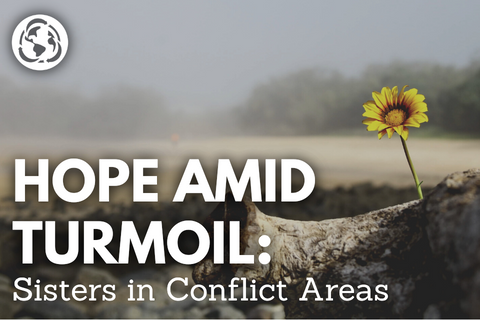
Traversing Europe's second largest nation is not for the faint-hearted, even in peacetime.
At 233,030 square miles, Ukraine — an immense country of rolling plains, grasslands and steppes — is just slightly smaller than Texas, and traveling from the country's far west to eastern areas can be daunting.
By car, a journey from Mukachevo, a city of about 86,000 residents not far from the border with Slovakia, to eastern cities such as Kharkiv or Mykolaiv can take 15 hours without stops; to Kramatorsk about 20 hours.
But the distances mean little to sisters like Lydia Timkova, who have committed to regular trips across the country to shepherd food, medical supplies and other items to civilians living near the Russian front.
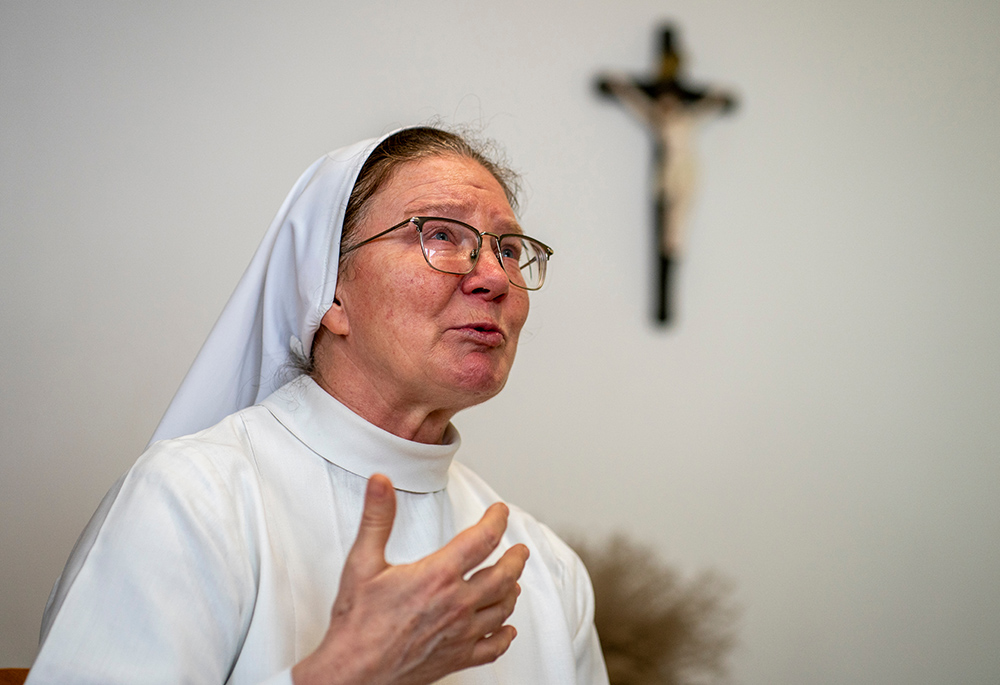
Sr. Lydia Timkova, 56, a Slovakian sister and member of the Dominican Sisters of Blessed Imelda, is pictured during an interview in early February at the convent she shares with other sisters in Mukachevo, Ukraine. Reflecting on her travels to the eastern front, she said, "With God, I feel boundless love for the people I meet. Even if I am in a dangerous place, I ask, 'Why should I be afraid?' " (Gregg Brekke)
Twice this year, Timkova has journeyed east to where the battles are raging — first in February and more recently earlier this month. In 2022, she made two similar trips.
On all the journeys, Timkova has witnessed "destroyed houses, roads, cars, and worst of all, destroyed lives."
"It is always like a sword that pierces my heart, and it cries bloody tears."
During a recent visit in the village of Oleksandrivka in the Mykolaiv region, Timkova sat down at a badly damaged upright piano in a village hall that had been shelled by Russian artillery. With fallen debris all around her, she played a few notes and lamented the piano's condition. "Nothing," she said wistfully. "It's so scary."
Timkova, 56, a Slovakian sister and member of the Dominican Sisters of Blessed Imelda, like many non-Ukrainian sisters who have ministered in Ukraine for years, has fully embraced the country and its people, adopting both as her own.
"I felt that I was going to my own people," she said in a recent email to Global Sisters Report following her latest visit to the east.
She spoke similarly in an interview earlier this year at a convent in Mukachevo.
"I've been here so long, my heart is here," she said. "The Slovak Republic is my native land, but here, well, I can't give up."
One reason Timkova can't give up is because she believes hers is a secondary role. "God is always there in the first place," she said. "He gives me power and understanding of what I should do."
That sense of empowerment undergirds a sense of duty, calling and mission in a country now under siege.
During the recent mission, Timkova said it was difficult to see the dashed hopes of displaced families as they returned home to their communities, only to find their homes destroyed. "They have nowhere to live now," she said.
What particularly sticks in the memory are the children — the children who had returned home with their parents. "They helped us carry things and ran around us. When we were leaving, the children were crying and asking me if I was coming back. One girl said to me, 'I'll be waiting for you!'
"If I had the opportunity, I would go there again right now," Timkova added. "Children's pure eyes in tears, or old people homeless under the bare sky. All this is in me, deep in my heart, and it hurts."
Going where no one else wants to go
Timkova believes the experiences of the war's victims, and not responders like herself, deserve the most attention. Yet in recalling her recent experiences traveling with Katarína Pajerská, who coordinates the Slovak mission of Caritas in Ukraine, she acknowledged the risks the two women faced.
"It was very hard when we came under fire this time last week," she said May 17 of the experiences in Torske, in the war-torn Donetsk region, about two miles from the Russian occupiers. "On the way we saw bombs falling, explosions, fire and smoke in several places."
It was considerably calmer during the earlier interview in February as snow fell outside the Mukachevo convent she shares with another sister and regular visiting sisters.
Even then, Timkova acknowledged the dangers of traveling to the east. But she said that she and others are "going where no one else wants to go."
"With God, I feel boundless love for the people I meet. Even if I am in a dangerous place, I ask, 'Why should I be afraid?' "
Advertisement
She caught her breath, began to tear up and then made a cutting motion with her hand. "When I meet people in a war zone, they are happy to see what little I can do for them. I listen to their stories — terrible stories. I listen to them, and I can't tell them that everything will be OK. All I can do is hear them, and embrace them."
The stories are searing — of women being forced by Russian soldiers to eat sand, of girls being raped, of neighbors tortured by having their fingernails pulled out.
Given those realities, Timkova feels it is an imperative and duty for those able to help to do so in the current environment.
She said she does not take undue risks — she always travels with others, for example.
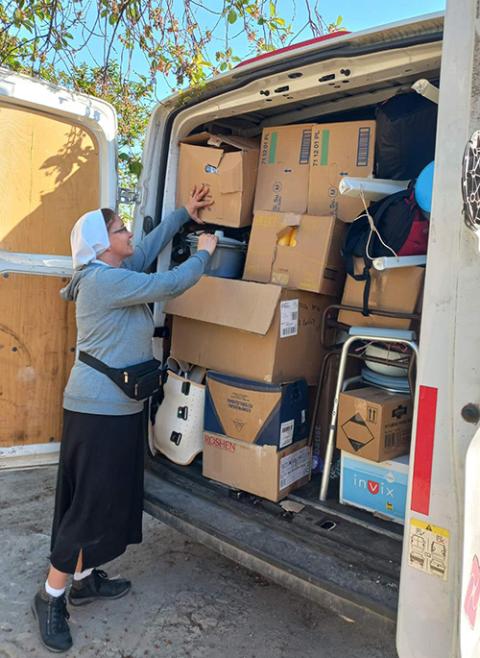
Sr. Lydia Timkova begins to unload items of a shipment she and Katarína Pajerská, who coordinates the Slovak mission of Caritas in Ukraine shepherded across Ukraine during a recent humanitarian mission. (Courtesy of Lydia Timkova)
And Timkova's time of "encounter" with those she assists is often brief, leaving shortly after arriving with a shipment to avoid potential complications and problems. The entirety of the visits take about a week — the latest was spent for several days each in Kharkiv, Mykolaiv, and then in villages around Mykolaiv.
"We distribute it in different ways, either directly to the people or to the village headman, who passes it on to the people," Timkova said. The assistance — such as food and household supplies — are donated by Slovakians and collected in churches and monasteries for later shipment in a van across the border into Ukraine.
Once at a designated front-line village, where there is always the risk of artillery shelling or coming upon land mines, Timkova and a travel companion, such as Pajerská of Caritas, are always accompanied by a local resident who helps them navigate the on-the-ground challenges.
Pajerská sees the work as helping right a grievous wrong.
"Nobody has the right to take the home of another people," Pajerská said of the Russian invasion, during an interview the same day with Timkova in the Mukachevo monastery. "And in the east, people have lost everything."
That causes them to flee — as is the case with Anastasia and Alexander Tomchuk, a young couple from the southeastern city of Zaporizhzhia who earlier this year had found refuge through a Dominican program called the Christian Center of St. Martin de Porres in Fastiv, not far from the capital of Kyiv. (The Fastiv program is not directly related to Timkova's congregation.)
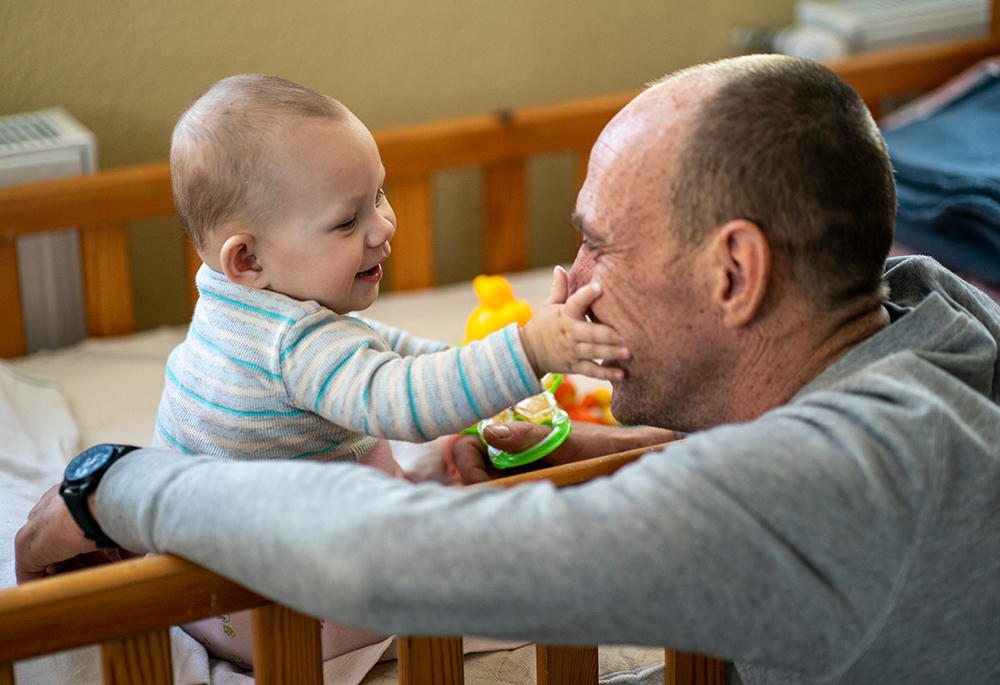
Anastasia and Alexander Tomchuk are a young couple from the southeastern city of Zaporizhzhia who earlier this year had found refuge through a Dominican program called the Christian Center of St. Martin de Porres in Fastiv, not far from the capital of Kyiv. Here Alexander is seen with the couple's newborn. (Gregg Brekke)
With six children to care for, including a newborn, the couple were preoccupied by what comes next: schools, another separation of the parents — the father was only visiting for one day having to return to Zaporizhzhia because of his work; and where to settle if they don't return permanently to Zaporizhzhia.
"The most important thing are the kids," Anastasia said, adding, though, that plans can be quickly altered. "Every moment can turn into something new," she said, shrugging her shoulders.
Those kinds of ever-present realities make humanitarian work daunting for those like Timkova and Pajerská. But Pajerská finds the long days of journeying with Timkova invigorating because prayer — rather than music blaring from a radio — becomes the calming rhythmic hum of travel across Ukraine's sprawling countryside.
"It's very nice to have a travel partner, but when I'm with Sr. Lydia, I feel especially that the road is blessed," Pajerská said. "And it's not just about the aid, it's about belief — it's about God.
"I really have felt that God wants us to be there."
Pajerská recalls visiting one village in the Kharkiv region last year where the two came upon a partly destroyed home and found a wounded elderly man who needed assistance. "If Sister and I hadn't found him, he'd have died." At another locale, they met a struggling grandmother who, upon seeing the two visitors, looked to the sky and exclaimed, "Thank you, God."
With experiences like that, Pajerská said, "I have felt like we were on the right way. It's not just about the aid, but about giving people hope."
Pajerská said while traveling within a war zone it is helpful to travel with a sister. "When I'm with Sister Lydia, people are more open. They can trust us," she said. As one example: "The soldiers are more friendly."
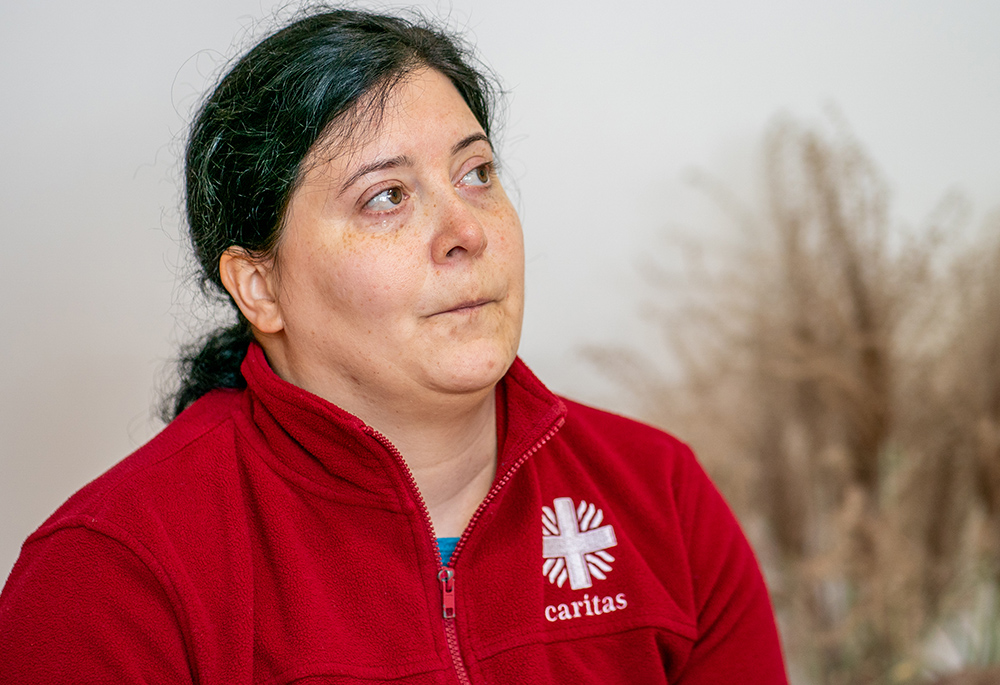
One of Sr. Lydia Timkova's travel companions to the war-torn east is Katarína Pajerská, who coordinates the Slovak mission of Caritas in Ukraine. "It's very nice to have a travel partner, but when I'm with Sr. Lydia, I feel especially that the road is blessed," Pajerská said. (Gregg Brekke)
In Ukraine: her soul, heart, children
For her part, Timkova downplays any idea that she is special. She contends that her real work remains as a teacher in Mukachevo, located in the very far eastern reaches of Ukraine and which has not felt the brunt of war like urban areas in the east and in Kyiv.
"I always come back here," she said of Mukachevo. "Here is my soul, my heart, my kids."
Timkova's path to avowed religious life was not easy — a common experience for sisters from Eastern Europe who grew up under the shadow of communist rule.
Born in the village of Bystré in the east of Slovakia, about 270 miles from Bratislava, now the capital of Slovakia, Timkova felt a calling as a teenager, deciding to enter the novitiate at age 19, and eventually taking vows in 1993. But the period of formation was challenging because of the still-extant fear of communist rule. Not even her family knew of her aspirations and it took years — and the end of communism — before she would don her habit.
"The advice I got was: be among the people. Go to the movies, go to the opera — all to hide the fact of my real calling."
"I would get up at 5 in the morning to meditate, go to work [at a children's rehabilitation center] and hide my calling, my 'blessed life,' " she said.
She recalls that all the sisters worried "about slipping — it was stressful. We were afraid." With the fall of communist rule, "we felt freedom and it was liberating to wear the habit," she said.
From the start, working with children — from newborns at a hospital to orphans to eventually teaching — felt like her calling.
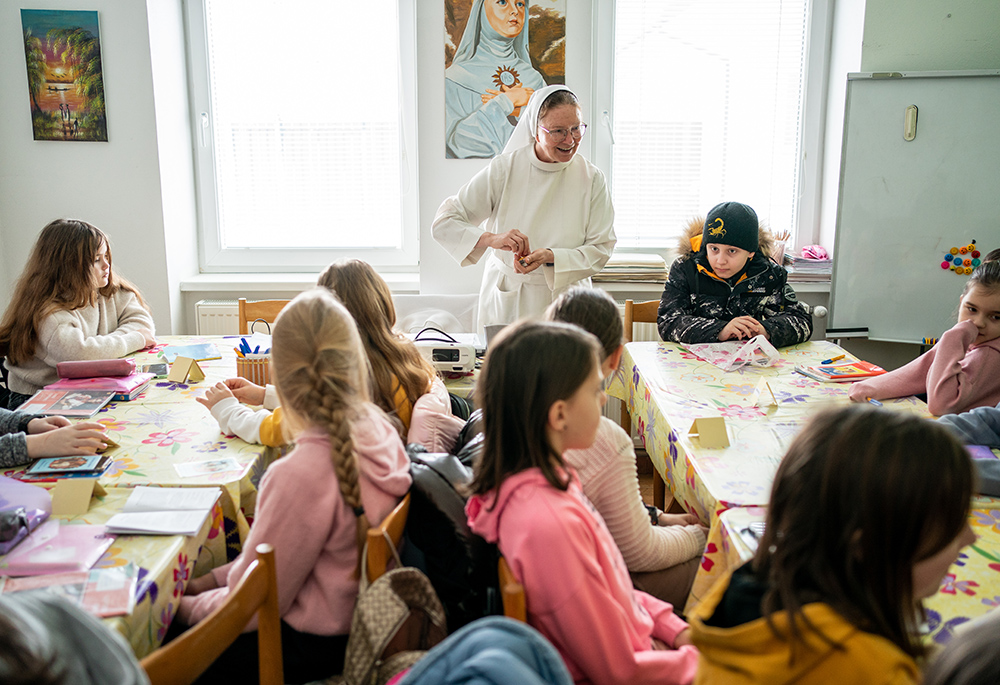
Sr. Lydia Timkova of the Dominican Sisters of Blessed Imelda teaches a catechism class in Mukachevo, Ukraine, in February. Timkova has made four cross-country missions to deliver humanitarian aid to areas in eastern Ukraine most affected by the war. Though that work is important to her, she says her primary calling remains as a teacher to her students. who include new arrivals from other parts of Ukraine displaced during the war. (Gregg Brekke)
Timkova's resulting ministry has spanned across countries — she first worked in Ukraine in 1994, returned to Slovakia for a time, then left Europe to work as a teacher in Cameroon. She returned to Ukraine in 2018. Timkova has lived and worked in Ukraine for a total of 15 years.
Upon her return, she felt the country had changed some — the Russian invasion and annexation of Crimea in 2014 marked a turning point. "I noticed that people spoke more and more about freedom," she said. "People felt the pain of that invasion. They spoke of losing something they had."
Even with that history, Timkova said the news of the full-scale invasion on Feb. 24, 2022, was still a shock. She and other sisters still didn't believe it would happen. "We prayed the rosary all day," she said, fingering her rosary beads, recalling the memory.
Every day for a year, she and others have prayed the rosary to the divine mercy at 3 p.m. — the time of Jesus' death.
"People are uniting — prayer is a way to unite people," she said.
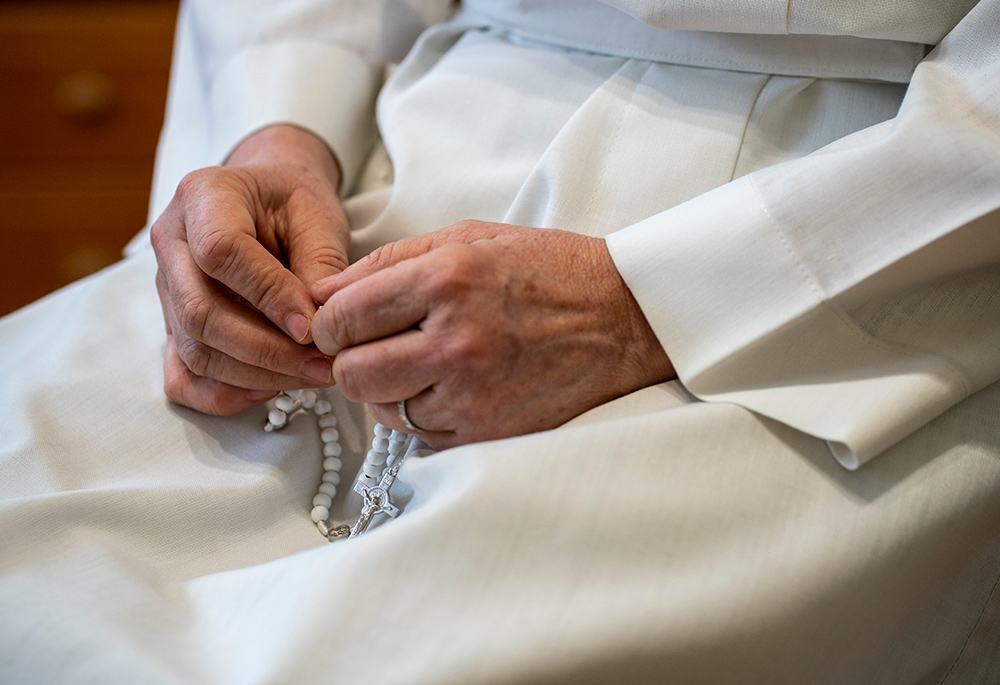
Sr. Lydia Timkova, 56, a Slovakian sister and member of the Dominican Sisters of Blessed Imelda, is pictured with her rosary during an interview in early February at the convent she shares with other sisters in Mukachevo, Ukraine. She fingered the beads in recalling the shock of the full-scale Russian invasion of Ukraine on Feb. 24, 2022. (Gregg Brekke)
In Mukachevo, Timkova teaches catechism to teenagers and Christian education to adults and seniors. She hears and encounters the pain of families who have families in the east, as well as the experiences of those who have lost soldier relatives.
She knew one soldier herself — dead and buried in November.
Eleven residents from Kyiv, Kharkiv and Chernihiv who fled the war lived with the Dominican sisters in the Mukachevo convent for much of 2022. But by September of last year they had returned home.
For the first two weeks of war, "everything stopped," Timkova recalled — schools, markets, "normal life." Some sense of normalcy has returned, though not fully: the seeming quiet of Mukachevo can be interrupted at any time by air raid sirens.
"We have hospitals here. What do you do with patients?" she said. "It means they are always in danger. It's hard."
The challenges facing a country at war are as immense and as sprawling as the Ukrainian countryside. And they are daunting to everyone — sisters included. But Timkova believes her work is part of a plan that, at its core, remains an ineffable mystery.
She can't always fully comprehend it herself — but it must be respected and made tangible.
"I've dedicated my life to God, to helping people," she said. "And now I am feeling the living God. He gives me power."

